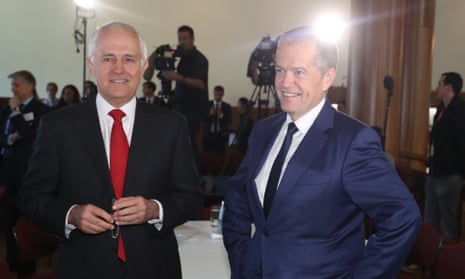Almost 80% of Australians believe the big banks will pass the Turnbull government’s $6bn bank levy straight through to their customers, according to the latest Guardian Essential poll, which continues to put Labor comfortably in front of the Coalition post-budget.
The new poll, released on Tuesday, has Labor ahead of the government on the two party preferred measure, 54% to 46% – which is the same as last week’s survey, and broadly in line with major polls taken in the week following the budget.
The recent run of static polls suggests there has been no immediate political fillip from the budget, despite a considerable effort from the government to reset the political contest with a pivot towards the political centre.
While the government since budget night has been jawboning the big banks to absorb the costs of the new tax, the survey shows consumers believe they will wear the costs rather than the institutions themselves.
Almost four-fifths (78%) thought that the banks would pass the cost of the new levy onto their customers.
The groups most likely to think the banks would pass through the costs were voters who had parted ways with the major parties, older people and Labor voters.
Only 7% of the survey of 1,007 respondents thought that the banks would not increase their fees, and would pay the levy from their own profits.
The public concern about the impact of the levy comes as three major banks, Westpac, the Commonwealth, and the National Australia Bank, outlined the specific costs of the budget measure on Monday.
Westpac said the levy would cost $260m after tax this year, and the bank warned there was no way it could “absorb” it. The Commonwealth Bank said the levy would cost approximately $315m a year, or $220m after tax, and the NAB said $245m.
Separately on Monday, the ratings agency S&P downgraded the credit scores of 23 smaller Australian financial institutions, warning that the risks of a downturn in the property market were increasing.
Apart from the cynicism about the banking measure, the new Guardian Essential poll shows there is majority support for Labor’s plan to restrict the government’s proposed 0.5% hike in the Medicare levy to fund the National Disability Insurance Scheme to taxpayers earning more than $87,000 a year.
The Turnbull government wants the increase to apply to taxpayers once they earn more than $21,000 but Labor last week resolved, after an internal argument, to support the levy hike only for the top two tax brackets – a decision that costs $400m over the forward estimates.
While the proposal was controversial internally, Labor’s plan to restrict the proposed increase in the levy to higher income earners was supported by 55% of the Guardian Essential sample.
A majority (54%) also favoured Labor’s current policy to maintain the 2% deficit levy on earnings over $180,000 a year – a levy the Coalition plans to abolish on 1 July.
The picture was more mixed on Labor’s position to oppose company tax cuts. Forty-one per cent of the sample approved of that stance, and 23% disapproved.
Voters were also asked to nominate which political party they trusted more to fund various government programs.
Labor was more trusted to fund Medicare (44% trust), the NDIS (36%), universities (41%), the age pension (45%) and public schools (45%) – while the Coalition was more trusted to fund independent/private schools (44%).
Interestingly, in the light of the budget debate about the future funding of the NDIS, 36% of the sample did not know which party they would trust more to properly fund the scheme.
Voters were also asked a number of questions about attributes they associated with the Liberals and with Labor, which underscores the default cynicism voters currently have with major party politics.
The attributes most commonly associated with the Liberal party were “too close to the big corporate and financial interests” (69%), “will promise to do anything to win votes” (69%), and “out of touch with ordinary people” (68%).
Attributes least commonly associated with the Liberals were “keeps its promises” (25%), “trustworthy” (25%) and “looks after the interests of working people” (28%).
Voters think the Liberals are less divided and less trustworthy than they were in March, when these questions were last asked, and there has been a 3% improvement in having “a vision for the future”.
The attributes most commonly associated with the Labor party were “will promise to do anything to win votes” (61%), “looks after the interests of working people” (57%), and “moderate” (56%).
Attributes least commonly associated with the ALP were “extreme” (28%), “keeps its promises” (32%) and “trustworthy” (34%).
Labor has gone backwards since March in three categories: “have good policies”, “clear about what they stand for” and “too close to the big corporate and financial interests”, all of which dropped by 5%.
Federal parliament has resumed for a two week sitting period, where the Turnbull government will start to move its budget measures forward before the winter break.

Comments (…)
Sign in or create your Guardian account to join the discussion